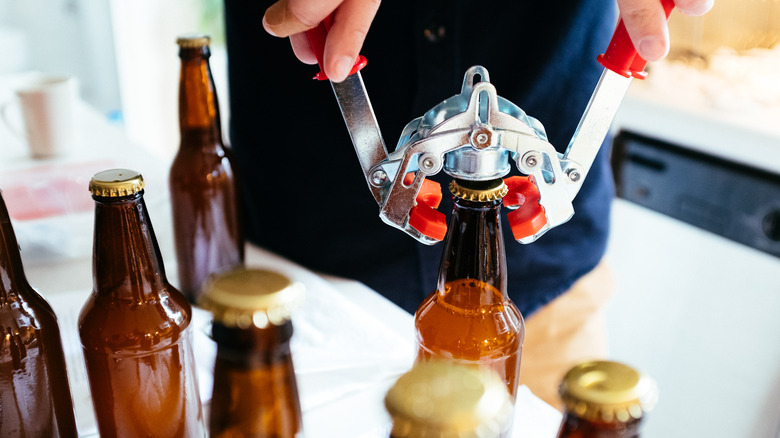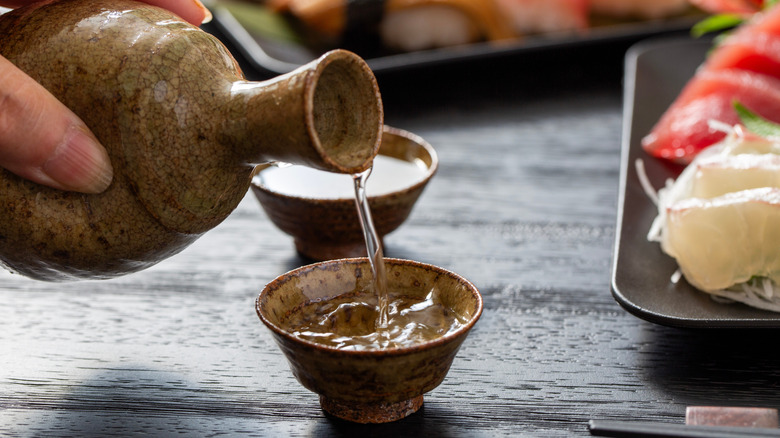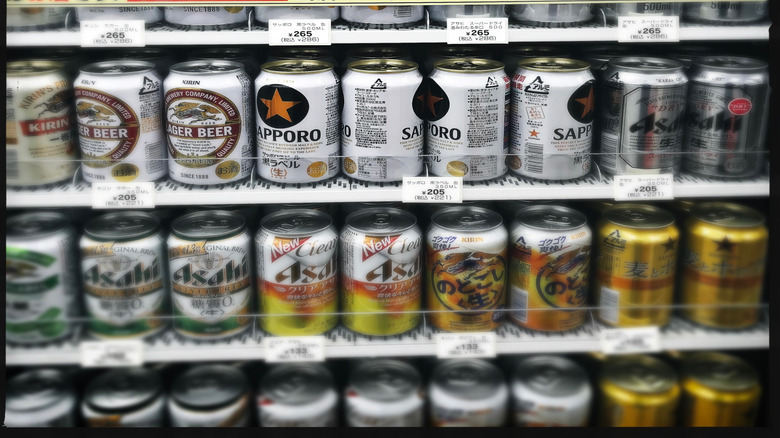The Unexpected Alcohol Law Tourists Should Know Before Visiting Japan
While visitors continue to flock to Japan for its ultra-modern cities, tranquil countryside, incredible culture, and natural splendor like its pristine, underrated national parks, it's also a terrific place to eat and drink. Japanese cuisine is known for its beautiful presentation, subtle flavor profiles, and balance, and meals are often washed down with cold beer or (sometimes hot) sake.
Japan is an ideal destination for anyone who enjoys their tipple, as the island nation is known for brewing and distilling quality alcoholic drinks. Case in point: They've gotten so good at making single-malt whiskies that they've even taken the top spot in international competitions. Japan takes its booze seriously, so it should come as no surprise that its drinking culture is governed by a set of rules, etiquette, and actual laws that anyone who plans on visiting the Land of the Rising Sun should become familiar with.
For example, pouring your own drink is something tourists should never do in Japan as it's considered rude. Let your compatriots do it for you. Also, never drink straight from the can or bottle at the bar, as the Japanese always use a glass. When out in public, drinking is completely acceptable, as long as you do so responsibly (don't be loud and obnoxious). However, when it comes to making your own stuff, don't even think about it. Home brewing is strictly illegal in Japan, and this can even apply to mixing certain cocktails, so proceed with caution.
Know the law and follow it
The law prohibiting homebrewing in Japan goes back to 1899, during the Meiji era. The idea was to concentrate sake production into the hands of a few big brewers in order to maximize tax revenue, and even though it may have outlasted its relevance, the law is still on the books. While the government loosened regulations in 1994 by allowing smaller breweries to produce beer (effectively opening the door for a craft beer scene), violators of the no homebrewing law face stiff penalties to this day.
These include fines of up to 1 million yen (around $6,600) or 10 years in jail if caught, so even though prosecutions for homebrewing are exceedingly rare, it's best not to risk it. It's also worth pointing out that the law doesn't just extend to making beer or sake, but also as far as sangria. The law specifically bans fermentation, which may happen during the process of making this wine punch as fruit is left to sit in the wine for a couple of days. It does, however, allow you to make your own umeshu (plum wine) at home, as long as you use a liquor with over 20% ABV since it will not ferment.
A quick guide to Japanese beer, sake, and spirits
Sure, brewing up your own stuff is strictly verboten in Japan, but the good news is that there are endless opportunities to sip boozy drinks created by professionals. While not brewed in Japan until the 1800s, beer is arguably king, with big brands such as Asahi, Kirin, and Sapporo pouring from taps from Hokkaido in the north to Okinawa in the south. Japan has also developed some quality craft beer brands over the years, including Osaka's Minoh, Kyoto Brewing Company, and Hitachino Nest.
Sake is arguably Japan's most famous alcoholic elixir, though it's worth pointing out that "sake" just means "alcoholic drink" in Japanese. What Westerners know as sake is actually called "nihonshu" (Japanese alcohol) locally, and there are thousands of varieties of this rice wine to choose from, ranging from sweet and fruity brews to those with a clean, dry finish. Served hot, chilled, or at room temperature, sake pairs perfectly with Japanese cuisine such as sushi and sashimi, and usually clocks at about 15% ABV, similar to any other wine.
Other Japanese alcoholic drinks include shochu, a vodka-like clear spirit that's usually served on ice. This liquor is usually around 25% ABV and can also be used as a mixer. Japan has also cultivated one of the world's leading whisky industries, with brands such as Suntory and Hibiki giving the founders in Scotland and Ireland a run for their money. If you're interested in sampling sake at the source, consider this scenic train trip through the Japanese countryside.


